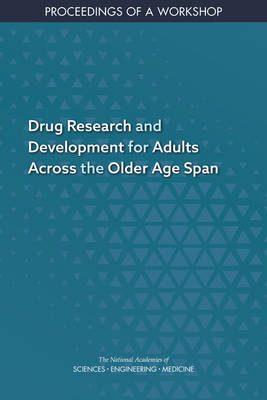
- Afhalen na 1 uur in een winkel met voorraad
- Gratis thuislevering in België vanaf € 30
- Ruim aanbod met 7 miljoen producten
- Afhalen na 1 uur in een winkel met voorraad
- Gratis thuislevering in België vanaf € 30
- Ruim aanbod met 7 miljoen producten
Drug Research and Development for Adults Across the Older Age Span
Proceedings of a Workshop
National Academies of Sciences Engineering and Medicine, Health and Medicine Division, Board on Health Sciences Policy, Board on Health Care Services, National Cancer Policy Forum, Forum on Drug Discovery Development and Translation, Forum on Aging Disability and IndependenceOmschrijving
There is a void in evidence-based information for making informed decisions on how to optimize care for older adults, particularly those 80 years and over. Because older adults are vastly underrepresented in clinical trials, there is a dearth of information about the appropriate use of drugs in this population. Yet older adults have higher rates of comorbidities and simultaneous use of multiple medications than the general population, and are the majority users of many medications. Additionally, age-related physiological and pathological changes, particularly for adults 80 years of age and older, can lead to significant differences in the pharmacokinetics (PK)2 and pharmacodynamics (PD)3 of a given drug compared to the general population.
On August 5 and 6, 2020, the National Academies of Sciences, Engineering, and Medicine hosted a workshop titled Drug Research and Development for Adults Across the Older Age Span. The workshop was designed to examine the challenges and opportunities in drug research and development for older adult populations, explore barriers that impede safety and efficacy studies in these populations, and share lessons learned for better understanding clinical pharmacology for populations over age 65. This publication summarizes the presentation and discussion of the workshop.
Specificaties
Betrokkenen
- Auteur(s):
- Uitgeverij:
Inhoud
- Aantal bladzijden:
- 142
- Taal:
- Engels
Eigenschappen
- Productcode (EAN):
- 9780309685689
- Verschijningsdatum:
- 29/01/2022
- Uitvoering:
- Paperback
- Formaat:
- Trade paperback (VS)
- Afmetingen:
- 152 mm x 229 mm

Alleen bij Standaard Boekhandel
Beoordelingen
We publiceren alleen reviews die voldoen aan de voorwaarden voor reviews. Bekijk onze voorwaarden voor reviews.











